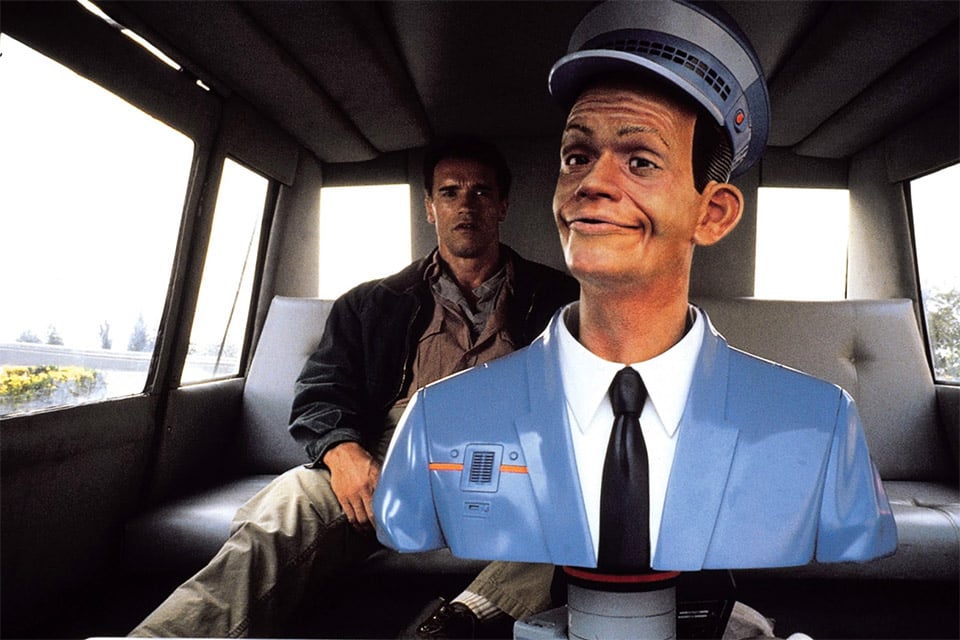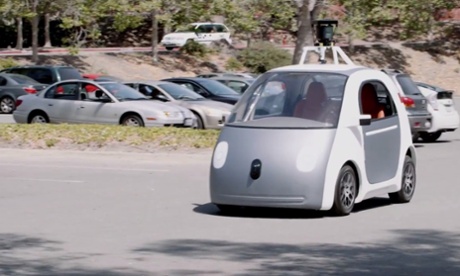How Smart Should Our Smart Cars Be?
 In a famous scene in „Total recall” (the new version), the two protagonists are driving a futuristic hovercar in a high-speed chase. At one point, the driver asks her passenger to take over the wheel… and then simply moves the wheel over to the passenger! The fact that this still evokes a feeling of surprise is the mark of our time, for despite all of the advances in technology, cars are still basically made like they were a hundred years ago. Sure, they’re faster and more efficient, sleeker and computerized. But they still have a steering wheel, a brake, a mirror… Well, not for long. Enter Smart Car!
In a famous scene in „Total recall” (the new version), the two protagonists are driving a futuristic hovercar in a high-speed chase. At one point, the driver asks her passenger to take over the wheel… and then simply moves the wheel over to the passenger! The fact that this still evokes a feeling of surprise is the mark of our time, for despite all of the advances in technology, cars are still basically made like they were a hundred years ago. Sure, they’re faster and more efficient, sleeker and computerized. But they still have a steering wheel, a brake, a mirror… Well, not for long. Enter Smart Car!

Amazingly, both „Total Recalls” may not be sci-fi daydreams anymore. According to a recent article on Wired, in just fifteen years cars won’t be equipped with mirrors, horns or emergency brakes. In twenty years, the steering wheels and pedals will be gone, too. The cited study, conducted by Institute of Electrical and Electronics Engineers (IEEE), compiled data from 200 specialists that work in the engineering sector. Its findings are simple: pretty much everyone is certain that cars are on their way to becoming much better drivers than you or me. Luckily, no smiling robots are likely to be installed in the driver’s seat. Aside from technological changes, like the ones with mirrors, brakes, wheels or pedals, there’s a ton of other predicted paradigm shifts throughout many industries. But how close are we to that future, really?
The truth is, the so-called „Smart cars” are already here. The 2015 model of Ford Edge comes with built-in tech to help drivers take their hands off of the steering wheel during long boring hours on the motorway. It will have adaptive steering (also called adaptive cruise control), collision braking (aka collision avoidance system) and a full-range front-mounted camera to help it „see” the world in front. The car itself will cost around USD 32 000, which isn’t cheap, but is already within an average Joe’s price range. And if you’re already an owner of some more expensive cars, you can actually cheap out on the whole idea. A recently released Cruise RP-1 sensor by Audi will grant your car awesome powers of road awareness at just around USD 10 000… But only if you’re already a lucky owner of an Audi A4 or S4. The computerized driver can move the wheel, press the pedals via a system of actuators, and integrates with the car’s brakes. It’s a similar system to the one boasted by Edge, in that as its eyes and ears it uses two cameras, a radar sensor and a GPS module. The only limitation is that so far, the Audi sensor works only around the US San Francisco Bay Area.
The way it works is far from completely autonomous, though. The driver has to enter the motorway traffic and can enter cruise control from there. Once near the destination, however, the boring old human will have to take over from the all-knowing machine, on account of the latter being as yet unable to join or leave traffic. Fully driverless tech it’s not, at least for now.


„Today” is a very flexible term though, as the tech is still a ways off from mass availability. It uses a sophisticated LIDAR system, a spinning laser (mounted on top of its roof) that maps out in 3D all of the car’s surroundings to properly align it to the road and understand where it is in relation to other objects. It costs a cool USD 70 000 and is unlikely to become much cheaper. In addition, the car’s „brain” is very sensitive to cell signal, in that it requires a constant Internet connection to be able to use Google Maps.
It’s an undeniably intriguing idea, even if it’s still in its infancy. Google promises that what Google’s Map service „knows” about the world (and that’s A LOT!), any driverless car will also be able to „understand”. It’s nice in theory, but in practice if you go slightly off the grid or away from Google-mapped areas, your car will likely just stop, not knowing where to go from there. Suddenly, being stranded in a car with no steering wheel or gas pedal seems like a much scarier prospect.

 Cars that drive themselves can have a knock-on effect on so many industries and walks of life, that one analyst says it will be similar to the move away from horses to cars. He also claims that that may actually be a good thing. Traffic accidents in the US alone account for USD 871 bln annually, a figure that will drop drastically once accurate and less accident-prone (one hopes) automated cars are commonplace. Dan McLaughlin over at the Federalist says it won’t mean complete eradication of the traffic accident, since „A truly driverless road would not be accident-free, given the number of accidents that would still be caused by mechanical and computer errors, weather conditions, pedestrians, bicyclists, motorcyclists and sheer random chance.” That said, he is adamant that „it would make the now-routine loss of life and limb on the roads far rarer.”
Cars that drive themselves can have a knock-on effect on so many industries and walks of life, that one analyst says it will be similar to the move away from horses to cars. He also claims that that may actually be a good thing. Traffic accidents in the US alone account for USD 871 bln annually, a figure that will drop drastically once accurate and less accident-prone (one hopes) automated cars are commonplace. Dan McLaughlin over at the Federalist says it won’t mean complete eradication of the traffic accident, since „A truly driverless road would not be accident-free, given the number of accidents that would still be caused by mechanical and computer errors, weather conditions, pedestrians, bicyclists, motorcyclists and sheer random chance.” That said, he is adamant that „it would make the now-routine loss of life and limb on the roads far rarer.”



VOCABULARY
Total Recall – Pamięć Absolutna
protagonist – bohater
hovercar – auto-poduszkowiec
passenger – pasażer
to take over the wheel – przejąć kierownicę
to evoke – przywoływać
for – albowiem
despite – pomimo
advance – postęp
sleek – opływowy
brake – hamulec
imaginary – wyobrażony
deliberately – celowo
motor – samochód (UK)
vehicle – pojazd
unforgettable – niezapomniany
to feature – przedstawiać
torso – tors
cab – taksówka
amazingly – co zdumiewające, niesłychanie
daydream – mrzonka
according to – według
to equip sth with sth – wyposażyć coś w coś
horn – klakson
emergency – awaryjny
to cite – przytaczać
to conduct – przeprowadzić
engineer – inżynier
to compile – skompilować, zebrać
findings – wyniki
seat – siedzenie
predicted – prognozowany
paradigm shift – zmiana sposobu myślenia, przełom pojęciowy
so-called – tak zwany
built-in – wbudowany
tech – technologia/technologie
motorway – autostrada (UK)
adaptive – adaptujący się, dostosowujący się
cruise control – automatyczna kontrola prędkości (na autostradzie)
collision – zderzenie, kolizja
aka (also known as) – znany również jako
avoidance – unikanie
full-range – pełnozakresowy
mounted – zamontowany
average Joe – przeciętny Kowalski
price range – zakres cenowy
to cheap out on sth – tanio coś zakupić, oszczędzić na czymś
to release – wypuścić (na rynek)
sensor – czujnik
to grant – przyznać, dać
awareness – świadomość
via – za pośrednictwem
actuator – przełącznik
to boast sth – móc się czymś pochwalić/szczycić się czymś
limitation – ograniczenie
bay – zatoka
autonomous – autonomiczny
to enter – tu: wjechać
traffic – ruch (drogowy)
destination – cel
all-knowing – wszystkowiedzący
on account of – z powodu, przez to, że…
latter – ten drugi, ostatni z wymienionych
as yet – jak dotąd
unable – niezdolny
driverless – bez kierowcy, zautomatyzowany (pojazd)
unsurprisingly – co nie (jest) dziwne, co nie dziwi
in that regard – w tej kwestii
on the forefront – na pierwszym planie, na czele/przedzie
concept – koncepcja
gizmo – ustrojstwo
to attach – podpiąć, podłączyć
well made – dobrze wykonany
to mock – wyszydzać
to belittle – umniejszać, zlekceważyć
fad – chwilowa moda
to percolate – parzyć się, dochodzić na wolnym ogniu
to hit the road – wyjechać na ulice
due to – z powodu, przez
actual – faktyczny
two-seater – auto z dwoma miejscami siedzącymi
to convert – przekształcić
tailor-made – wykonany specjalnie w jakimś celu
to take advantage of sth – skorzystać z czegoś
approach – podejście
carmaking – produkcja aut
efficacy – efektywność
founder – założyciel
well-served (by sth) – dobrze obsłużony, któremu coś dobrze służy
flexible – elastyczny
term – słowo, pojęcie
a ways off from sth – dość daleko od czegoś
sophisticated – skomplikowany
spinning – obrotowy
surroundings – otoczenie
properly – właściwie
to align sth – wyrównać coś
in relation to sth – w stosunku do czegoś
a cool X – okrągła sumka X
unlikely – mało prawdopodobny
sensitive – czuły, delikatny
cell signal – poziom sygnału sieci komórkowej
constant – stały
undeniably – niezaprzeczalnie
sth is in its infancy – coś jest w powijakach
slightly – odrobinę
off the grid – poza siecią, z dala od komunikacji
to be stranded – utkwić gdzieś, zagubić się daleko od cywilizacji
prospect – perspektywa
facet – aspekt
concern – obawa
to warn – ostrzegać
to hijack – porwać
lawmaker – ustawodawca
to express – wyrazić
overall – ogólny
notably – szczególnie, w szczególności
to welcome sth – powitać coś z otwartymi ramionami
advent – nadejście
knock-on effect – efekt domina
walks of life – sfery życia
accident – wypadek
to account for X – stanowić X, wynosić X
annually – rocznie
figure – liczba
prone – skłonny, podatny
commonplace – powszechny
eradication – wykorzenienie
error – błąd
condition – warunek
pedestrian – pieszy
bicyclist – rowerzysta
sheer – najzwyklejszy (na świecie), prosty
random – przypadkowy
adamant – stanowczy
routine – zwyczajowy, typowy
loss of life and limb – utrata zdrowia i życia
various – rozmaity
for instance – przykładowo
a different kettle of fish – zupełnie inna bajka
drinking age – granica wiekowa spożycia alkoholu
to prevent – zapobiec
irresponsible – nieodpowiedzialny
content – zawartość
irrelevant – nieistotny
scenario – scenariusz
combined – wzięty jednocześnie, w sumie
savings – oszczędności
impact – wpływ
abstract – abstrakcyjny
relatively – stosunkowo
invention – wynalazek
lorry – wywrotka
chauffeur – szofer (np. wynajęty)
delivery boy – roznosiciel
numerous – liczny
obsolete – zbędny
move – przejście
a host of sth – ogrom czegoś
to go for good – zniknąć na dobre
remaining – pozostający
refuge – schronienie
drive-time programming – programy radiowe dla kierowców
live – na żywo
entertainment – rozrywka
to text – pisać SMSy
to arrive – nadejść
nondescript – nijaki
optional – opcjonalny
reassuringly – uspokajająco
to show off – popisać się
honey – kochanie, sympatia
by Prochor Aniszczuk







